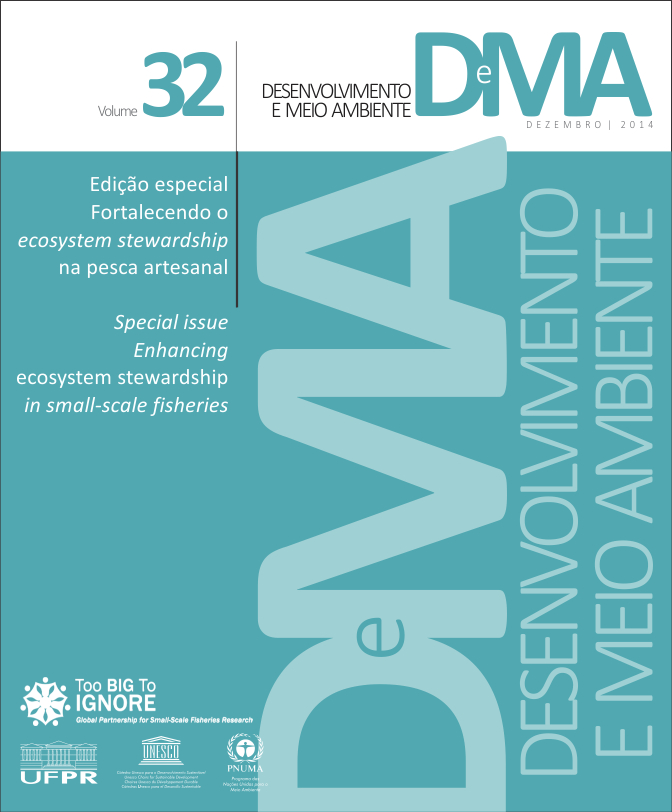Participatory Extension to the Sustainability of Artisanal Fisheries
DOI:
https://doi.org/10.5380/dma.v32i0.35949Keywords:
artisanal fishing, traditional ecological knowledge, participatory fisheries extension, ethno-science, socio-cognitionAbstract
The present work consists in a methodological proposal for the fishing activity extension project. It will be coordinated by a Production Engineering Program team from COPPE/UFRJ, focusing on the Natural Resources Management for the sustainability of the marine artisanal fishing in a southeastern Brazil seaside region. Such proposed methodology is interactive and it is recursively developed, configuring it through a dialogic advice. This methodology assumes that the whole problem is of complex extension, making essentially the interdisciplinary and interaction approaches. Therewith, the resolution problems in the handmade fishery department may be performed by sharing scientific and traditional marine knowledge. In this way, the approach is an alternative to the linear and anti-dialogical conception, as it was denounced by Paulo Freire in his seminal work "Comunicação ou Extensão?" (Communication or Extension?), about the extension in Brazil. This methodology founded the Brazilian government fishery extension politics between the last century's sixties and seventies, whose outcome was harmful to the country coastal, estuarine and seafarers ecosystems, affecting their productivity and artisanal fishing itself: rapid urban expansion, rampant growth of tourism with the devaluation of the local cultures, location of industrial parks, pollution, construction of roads, lack of sanitation and others. The purpose of this article is to provide a methodological framework for extension projects that is appropriate to the complexity of artisanal fisheries, characterized by multi-species and associated patterns of regularity of marine ecosystems interventions whose dynamics is highly uncertain with random and chaotic movements. Its main theoretical references comprise three perspectives: (a) the reciprocal implications between theory and practice of action research, (b) the essential communication and language in the instruments of participatory methodologies, (c) management by processes in community-based of small-scale fishers. These perspectives, in turn, are theoretically grounded in two fields of interdisciplinary studies: Ethno-science and Socio-cognition.
Downloads
Published
How to Cite
Issue
Section
License
Copyright on works published in this journal rests with the author, with first publication rights for the journal. The content of published works is the sole responsibility of the authors. DMA is an open access journal and has adopted the Creative Commons Attribution 4.0 Not Adapted (CC-BY) license since January 2023. Therefore, when published by this journal, articles are free to share (copy and redistribute the material in any medium or format for any purpose, even commercial) and adapt (remix, transform, and create from the material for any purpose, even commercial). You must give appropriate credit, provide a link to the license and indicate if changes have been made.
The contents published by DMA from v. 53, 2020 to v. 60, 2022 are protected by the Creative Commons Attribution-NonCommercial-NoDerivatives 4.0 International license.
DMA has been an open access journal since its creation, however, from v.1 of 2000 to v. 52 of 2019, the journal did not adopt a Creative Commons license and therefore the type of license is not indicated on the first page of the articles.




